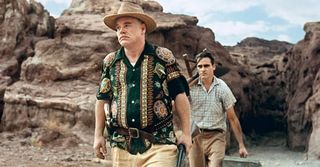The Master's Deleted Scenes: The More You Think You Know, The More You Don't

Most directors can't get away with cutting together their deleted scenes into a standalone montage, nor should they. Deleted scenes on Blu-ray releases are most often graveyards of overwritten ideas, redundant bits of dialogue or tangents for the story that, for one reason or another, couldn't fit into the final product. Hitting the "play all" button can feel like watching the world's weirdest sketch comedy show, snippets of ideas vaguely related to the movie in question. But for the most part these features are curios, intended for the film's fans and just about nobody else.
The Master, last year's beguiling gem from Paul Thomas Anderson, is the exception to most rules, and its deleted scenes are too. Cut together by Anderson, complete with music from Jonny Greenwood and a few period-appropriate songs, the scenes have been perfectly described as a kind of B-side to The Master, a companion that echoes the same themes but is distinct from the main product. The compiled scenes, called "Back Beyond," are even less linear and straightforward than the film itself, swooping between Freddie Quell's (Joaquin Phoenix) military service to his time spent with The Cause in Philadelphia and ending, hilarious, on an early scene between Quell and Lancaster Dodd (Philip Seymour Hoffman) in which the actors can't stop giggling. The photography in some of these scenes-- like when Freddie races back to his ship after shore leave and finds it gone-- is jaw-dropping; knowing how much it costs to shoot a film on 70 mm, you're aware Anderson had a very, very good reason to leave scenes this expensive out.
For those who couldn't wrap their minds around The Master-- and I was one of them at first-- the scenes in "Back Beyond" will only add to the frustration, unveiling new character wrinkles (like Freddie's potential homoerotic spark with Dodd's son-in-law) and an entire, inexplicable moment of surrealism that's a massive departure from the rest of the film's tone. If you want to argue that The Master is a lot of ideas in search of a structure, these deleted scenes could easily do it for you. Why leave out a scene that makes the parallels between Dodd and Scientology founder L. Ron Hubbard even clearer? Why cut a moment in which Freddie is brought to the stage to receive an award in front of the entire Cause congregation, looking sheepish and bewildered but also delighted? There is much more of the movie sold as an expose of Scientology in these deleted scenes, with more specific conversations about the purpose of The Cause and even an analysis scene between Freddie and Laura Dern's Helen Sullivan, a character mysteriously sidelined in the final cut. Each of these scenes offers a bit more clarity. The Master was already longer than 2 hours. What difference would these extra 20 minutes have made?
When I first wrote my review of The Master, calling it " frustratingly inaccessible and opaque about its meaning," I might have been desperate for these extra scenes of detail. But having fallen in love with The Master precisely for its opaqueness, and its willingness to skirt around the actual teaching of the cult ostensibly at its center, I see these scenes the way I think Anderson intends them: footnotes that you can truly take or leave. The Master is not a movie about Scientology or even "The Cause," but about Quell and Dodd, and the push-pull, deeply and terrifyingly tender relationship between them. You learn more about each of them individually watching these scenes, seeing more of Freddie's sexual obsession and Dodd's interaction with his followers, but it seems nearly every detail of their relationship to each other made the final cut.
The one exception is what seems to be an entire subplot, suggested over a series of distinct scenes, in which Freddie becomes interested in Dodd's book that is rumored to have inspired some readers to suicide. It's inside the box the two of them dig up in the desert, and in a cut scene we see Freddie charged with guarding the box inside an office, playing hero with a gun and visibly resisting the urge to open it. When he does, he's met with a box full of flames-- maddeningly teased in one trailer-- that suggest he's unlocked something both unknowable and now ruined. The scene makes sense as a catalyst for Freddie later running away from The Cause, for a rift between him and Dodd that can't be sealed. As seen in the film, that rift is less explicable-- to both men, and of course, to the audience.
The Master is about two men attempting to understand themselves by understanding each other, and how in the end, each of them essentially fails. We understand Dodd and Quell perhaps a little better than they know themselves, but never fully, and the deleted scenes of The Master prove that extra time spent with them can be a pleasure, but it raises as many questions as it answers. Anderson's hand in editing together only makes it all the more mysterious, juxtaposing scenes that don't seem to belong together-- Freddie roughhousing in the lawn with Lancaster to the audio of his analysis, for instance-- and suggesting an authorial hand in what, technically, isn't part of the film at all. Just when you think you've got The Master and its characters in sight, you tell them to pick a point, and off they go into the desert distance.
The Master is currently available for purchase on Blu-ray and DVD.
CINEMABLEND NEWSLETTER
Your Daily Blend of Entertainment News
Staff Writer at CinemaBlend
Most Popular





